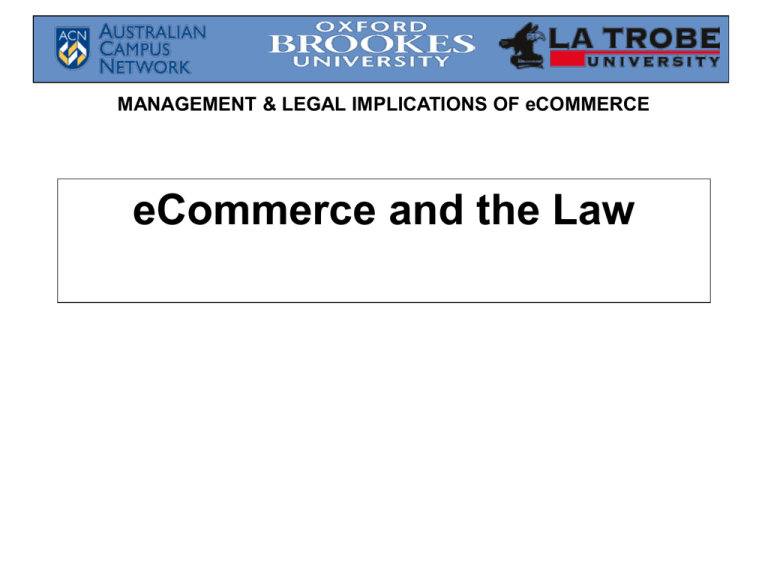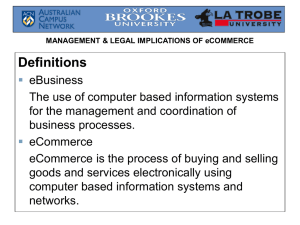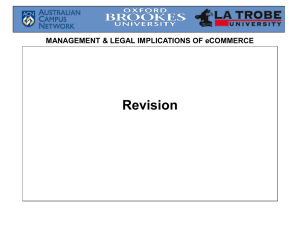Legal implications of electronic commerce
advertisement

MANAGEMENT & LEGAL IMPLICATIONS OF eCOMMERCE eCommerce and the Law MANAGEMENT & LEGAL IMPLICATIONS OF eCOMMERCE Law and management Why do managers need to be aware of legal issues, surely this what we pay the lawyers for? MANAGEMENT & LEGAL IMPLICATIONS OF eCOMMERCE Law and Management Business needs to have good corporate governance to survive. Business law sets down the parameters for good corporate behaviour. Failure to comply is not only bad business but may have severe legal consequences. MANAGEMENT & LEGAL IMPLICATIONS OF eCOMMERCE Law and Management Be aware of the legal issues so you can make sure compliance is embedded in your everyday business practices. Then you may not need a lawyer which will save you a lot of money Electronic Commerce challenges the existing law. It is important for managers to be aware of the law as it applies to EC and problem areas that may require reform or undergo change. MANAGEMENT & LEGAL IMPLICATIONS OF eCOMMERCE Vicarious Liability The Principle of vicarious liability is that the employer: Is liable to indemnifying a third party for damage or loss suffered; As a result of a wrongful act committed by an employee In the course of an employee’s employment . MANAGEMENT & LEGAL IMPLICATIONS OF eCOMMERCE Vicarious Liability This liability extends also extends to claims by other employees of the employer arising out of the wrongful act of an employee. The wrongful act may be in: Tort (which includes negligence and defamation); or Breach of a statutory duty under legislation such as the Trade Practices Act. MANAGEMENT & LEGAL IMPLICATIONS OF eCOMMERCE Occupational Health and Safety The employer is also responsible for: maintaining a safe place of work pursuant to occupational health and safety legislation; and Maintaining an workplace free of harassment and discrimination pursuant to anti discrimination and anti harassment legislation MANAGEMENT & LEGAL IMPLICATIONS OF eCOMMERCE Law and eCommerce What is law? What laws govern a person engaged in eCommerce or an eCommerce transaction? What areas of law are affected by EC? Is the existing law good enough? How do societies regulate themselves? MANAGEMENT & LEGAL IMPLICATIONS OF eCOMMERCE Law and Discontinuity Discontinuity is a change so encompassing that it transforms the standards by which it is measured. Discontinuity challenges and destroys the assumptions which we hold true E-commerce is threatening to be the latest example of discontinuity MANAGEMENT & LEGAL IMPLICATIONS OF eCOMMERCE Challenge of E-commerce EC challenges the commercial assumptions of: who and where the markets are; who competitors are; and how commercial organisations and relationships are structured MANAGEMENT & LEGAL IMPLICATIONS OF eCOMMERCE The law and EC Faced with discontinuity the law (lawyers) and other intermediaries must adapt. Each new application of eCommerce to the market process requires an analysis of the legal implications flowing from that application including what the law governs the process and the rights of the players associated MANAGEMENT & LEGAL IMPLICATIONS OF eCOMMERCE Peculiar features of cyberlaw No need for paper or other physical representation no clear geographic/ territorial or political limitations or delineations blurring of the concept of time and the linear order which the law likes to impose MANAGEMENT & LEGAL IMPLICATIONS OF eCOMMERCE Law of the Horse A few years ago, at a conference on the "Law of Cyberspace" held at the University of Chicago, Judge Frank Easterbrook told the assembled listeners, a room packed with "cyberlaw" devotees (and worse), that there was no more a "law of cyberspace" than there was a "Law of the Horse"; There is an important general point that comes from thinking in particular about how law and cyberspace connect. MANAGEMENT & LEGAL IMPLICATIONS OF eCOMMERCE 4 ways of regulating society Norms Markets Law Architecture MANAGEMENT & LEGAL IMPLICATIONS OF eCOMMERCE Jurisdiction One of the major issues Which country’s laws are to be applied to address the respective rights and obligations of the parties? What is the consequence of a country’s lack of jurisdiction? MANAGEMENT & LEGAL IMPLICATIONS OF eCOMMERCE Jurisdiction The Internet transcends geographic borders , there are no laws or borders on the Internet. There is no ‘Lex Internet’. Different countries have different Legal systems Criminal law consumer protection legislation etc MANAGEMENT & LEGAL IMPLICATIONS OF eCOMMERCE Jurisdiction Which taxation laws apply? Which criminal laws apply? When is copyright breached? What laws apply to contracts agreed upon over the Internet. Are ‘clickwrap’ agreements enforceable? MANAGEMENT & LEGAL IMPLICATIONS OF eCOMMERCE Enforcement Even if you have the law on your side there is the perpetual problem of enforcement. What good is a court order if you cannot enfoce it against the other person Another pervasive problem in Electronic Commerce MANAGEMENT & LEGAL IMPLICATIONS OF eCOMMERCE Approaches to Jurisdiction France The Yahoo case Germany The Adelaide Institute USA approach Minimum contact with Territory Australia Gutnik’s case MANAGEMENT & LEGAL IMPLICATIONS OF eCOMMERCE General problem areas Application of paper based law to electronic transactions Formation of contracts Admissibility of evidence Authentication integrity of electronic communication Record retention and management The need for regulation or let the market find its own balance Should there be more self regulation and codes of practice or unified International body of law MANAGEMENT & LEGAL IMPLICATIONS OF eCOMMERCE Specific areas of concern Contract Defamation Security Privacy Criminal activity Copyright Trademark Consumer protection MANAGEMENT & LEGAL IMPLICATIONS OF eCOMMERCE Contract Formation of the contract Offer, acceptance , digital signatures Jurisdiction and proper law Incorporation of terms “clickwrap contracts” Consumer perspective TPA, Goods Act MANAGEMENT & LEGAL IMPLICATIONS OF eCOMMERCE Security What is it. Why is it an issue for managers? Is it a legal issue? Encryption Keys Security over transactions Security over web sites MANAGEMENT & LEGAL IMPLICATIONS OF eCOMMERCE What security is available? 3 common methods include: Encryption Digital Signatures Firewalls MANAGEMENT & LEGAL IMPLICATIONS OF eCOMMERCE Encryption Hot issue Gives security but conflicts with needs of national security. Should the government be allowed to access private communications. Is it essential for business? MANAGEMENT & LEGAL IMPLICATIONS OF eCOMMERCE Internet transaction systems There are about 65 current systems available for making simple transactions. Range from the sophisticated digital coin system to variations on the credit card and cheques based systems called cheques in the net. Credit cards seem to have won the day MANAGEMENT & LEGAL IMPLICATIONS OF eCOMMERCE Internet transaction systems Secure Socket Layer (SSL) relies on digital certificates Has beaten proprietary systems developed by banks, Visa etc. Stored value cards (Smart cards) MANAGEMENT & LEGAL IMPLICATIONS OF eCOMMERCE Smart card Need for consumer protection Code of conduct for smart card and stored value cards What are the legal problems? MANAGEMENT & LEGAL IMPLICATIONS OF eCOMMERCE Consumer Issues Competitive pricing of payment services to ensure equal access to all consumers Consumer protection from fraud Right to choice of institutions and payment methods Transaction privacy, safe record keeping and proof of payment Managing information privacy Risk management. MANAGEMENT & LEGAL IMPLICATIONS OF eCOMMERCE Privacy Data collection Data protection Surveillance Encryption Customer profiles developed from eg: smart cards (one of the selling points for banks) MANAGEMENT & LEGAL IMPLICATIONS OF eCOMMERCE Crime Hacking Pornography Stalking Illegal firearm sales Fraud Sexual harassment and discrimination Use of computer evidence MANAGEMENT & LEGAL IMPLICATIONS OF eCOMMERCE Unauthorised Use Disruption Terrorism/ Violation Virus : A program that modifies other computer programs ensuring the infected program replicates the virus. Worms: A stand alone program that replicates itself. uses a computer network to duplicate itself, and doesn’t need help from a human hand. MANAGEMENT & LEGAL IMPLICATIONS OF eCOMMERCE Logic bombs Tells a computer to execute a set of instructions at a certain time under certain specified conditions. An attacker can reach thousands of computers at once. Or shut down a banks security system at a given time - say 3 PM on a Friday night. MANAGEMENT & LEGAL IMPLICATIONS OF eCOMMERCE Trojan Horses Is a program which performs some apparently useful function But also contains a hidden code that is malicious. For example will permit outside access at a given time. MANAGEMENT & LEGAL IMPLICATIONS OF eCOMMERCE Denial of Service (DOS) - attacks and overwhelms websites and stops them from communicating with other computers. One computer becomes the master (operated by a hacker) and other computers the slaves or zombies, giving illegal access to information, MANAGEMENT & LEGAL IMPLICATIONS OF eCOMMERCE Identity Theft When one’s identity is wrongfully used by another use of another’s credit card Pose as another to ruin a reputation or other example forged letters How do you establish identity in an electronic world MANAGEMENT & LEGAL IMPLICATIONS OF eCOMMERCE Defamation Name calling in cyberspace E-mail issue Publication of information likely to harm the reputation of another Site of the defamation (jurisdiction) mailing lists, newsgroups Liability of service providers Gutnik’s Case MANAGEMENT & LEGAL IMPLICATIONS OF eCOMMERCE Taxation Electronic payment systems have evasion potential (cash economy?) Jurisdiction rules doubtful Need to administer domestic tax laws internationally Encryption presents difficulties Taxpayer identity uncertain MANAGEMENT & LEGAL IMPLICATIONS OF eCOMMERCE Taxation How is the tax department going to approach the problem? Most jurisdictions have ignored the problem so far because Too difficult Not enough trade to warrant attention Need to encourage eCommerce to gain a national competitive advantage MANAGEMENT & LEGAL IMPLICATIONS OF eCOMMERCE Intellectual Property Framing & linking Your goodwill and image can be used as another's advertising (Seattle Sidewalk link to ticket master) Metatags Attaching another name to your HTML eg: Playboy Copyright MANAGEMENT & LEGAL IMPLICATIONS OF eCOMMERCE Web sites Trade Marks Barbie Doll and McDonalds chase defendants all over the globe Domain names How do you protect you name What is its status How does it interact with other forms of IP MANAGEMENT & LEGAL IMPLICATIONS OF eCOMMERCE Copyright Generally the use of the works of others without consent or appropriate acknowledgment Look at the problems Napster experienced







